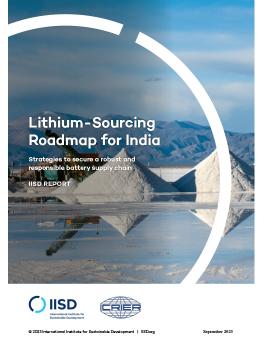
Lithium-Sourcing Roadmap for India
Strategies to secure a robust and responsible battery supply chain
This report aims to provide a strategy to guide policy-makers in sourcing lithium responsibly to promote clean energy manufacturing in India, with the aim of supporting low-carbon economic growth, creating equitable jobs, and helping to mitigate climate change impacts. It analyzes strategies of mineral-rich nations, key importing nations, and international companies, to provide recommendations for policy-makers and industry to secure lithium supply.
Lithium is a key mineral used in lithium-ion (Li-ion) battery technologies and is anticipated to play a pivotal role in driving the uptake of electric vehicles and stationary storage applications over the next decade. Its criticality is reflected in its inclusion in the critical minerals list of eight major global economies (the United States, European Union, Japan, Canada, Australia, China, Republic of Korea, and India), one of only three minerals to be included in an assessment by all eight countries (the others being tungsten and cobalt). In 2023, India reaffirmed lithium’s importance by designating it as a “critical” mineral along with 29 other minerals. The International Energy Agency (IEA) also forecasts that lithium for clean energy will see the fastest growth in global demand among different critical minerals, growing by 17 times between 2022 and 2045 under the IEA’s net-zero scenario, underscoring its unique importance in driving the energy transition.
India’s geostrategic allies and competitors have long recognized the importance of lithium in maintaining their industrial competitiveness and have taken steps to secure access to lithium resources through direct investments in overseas mines and long-term supply agreements, as well as setting up processing and refining capabilities. In contrast, Indian companies have thus far played a negligible role in the lithium battery supply chain, which, if left unaddressed, may create energy and economic security risks for the country. A lack of decisive action to secure a lithium supply in the coming decade could leave India behind in the race to develop a Li-ion battery manufacturing base and stymie the development of key industries such as electric vehicles and stationary storage applications, hindering India’s economic growth and job-creation potential.
The report would be useful to several Indian ministries, state-owned enterprises, such as Khanij Bidesh Limited (KABIL), as well as industry actors in India seeking to establish a presence in the global lithium supply chain.
Participating experts
You might also be interested in
India's Potential in the Midstream of Battery Production
This report summarizes consultations with over 25 companies and actors to determine what factors are crucial in the considerations of companies on where to invest in and expand battery cell manufacturing.
G20 Summit Agreement Fails To Strengthen Coal Phase-Down Even As Data Show High Per Capita Coal Emissions
As world leaders gather in New Delhi for the Group of 20 (G20) Summit–with 19 member countries and the European Union–data show that a majority of the group still has very high per capita coal power emissions. At the summit, countries agreed to "pursue further efforts" to limit the global average temperature rise to 1.5 degrees celsius, agreeing to "encourage efforts to triple renewable energy capacity globally" but the G20 New Delhi Leaders Declaration included no new commitment on phasedown of coal power or on phasing down all fossil fuels.
Blackouts and Backsliding: Energy subsidies in South Africa 2023
Blackouts and Backsliding presents the latest energy subsidy data for South Africa.
Financial Benefit-Sharing Issues for Critical Minerals: Challenges and opportunities for producing countries
Exploring nuances in the key features of critical minerals and the new challenges and opportunities they present to fiscal regulation.